Overview
(terrencepowderly)
In 1584, after he asked many times, Sir Walter Raleigh was granted right to settle the first English colony in the New World. He sent Captain Barlowe and Amadas, along with two ships, to plant a colony. The men sailed through a water way known as Oregon Inlet and sighted land. Roanoke Island seemed to be the perfect area to start a permanent English colony. The men named the area Virginia after the Virgin Queen. In modern times this area is known as Outer Banks, North Carolina. This settlement would be ideally used as a military base since it was relatively small and not easily seen.
The captains returned to England and raved about the island that the had chosen. Again ships sailed to the New World with the promise of a bright future, but this time instead of two ships, there was seven. The settlers unluckily lost many of the food rations, and with the prospect of having a permanent colony, they colonists had to send a ship back to England to bring back more supplies. Despite the lack of supplies the colony was virtually able to construct many of the building and houses before the nearing winter. Unfortunately the ship sent to bring back supplies was not able to acquire the financial backing to return to Roanoke Island. The colonists were forced to live on there own.
A few months later Sir Francis Drake arrived to Roanoke Island. Drake had lost all supplies due to a very bad storm so he brought no relief to the struggling colonists. Consequently, all but three men returned with Drake to England.
In 1587, Raleigh again returned to the New World in hopes of creating a new colony, but this time they intended on settling north of Roanoke Island in the Chesapeake Bay area. Yet again the colony was settled in the abandoned Roanoke Island. Life thrived for a season; the first child born in the New World was born and named Virginia Dare. The governor of the settlement returned to England and hoped to bring back supplies to the colony but the British and Spanish were in a conflict, so Queen Elizabeth ordered at all British ships would be used to defeat the Spanish Armada. When the Governor ,John White, finally did manage to return to Roanoke Island, it was abandoned. The only sign of a human presence was the word "CROATAN" craved into an old tree.
http://roanokeisland.com/RIFP-History.aspx
(terrencepowderly)
Many stipulations were formed trying to explain what happened to the 'Lost Colony'. Three theories stand out as the most plausible: a strong hurricane killed all the population, the Native Americans massacred the colonists to prevent further colonization, or that the colonists married Native Americans and adopted their culture. The latter of the three has the most evidence for truth. Many later European settlers say that the some of the Croatan Indians were lighter skinned, had grey eyes, and could read English. Also it is reported that many of the Croatan Indians say that their ancestors came from "Roanoke in Virginia". they may be eluding to the first name given to the region, Virginia, even though it was renamed North Carolina
http://totallyhistory.com/roanoke-island-mystery/
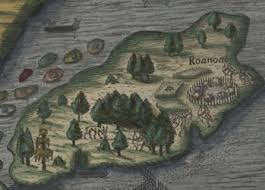
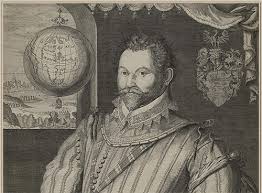
(terrencepowderly) (terrencepowderly)
http://3sslam.wikispaces.com/Roanoke+Island+Mystery http://memory.loc.gov/intldl/drakehtml/rbdkcap.html
(FrancisPerkins13)
Roanoke Island is located in present-day North Carolina, and was the site of England's first colony. In 1584, Sir Walter Raleigh, whom was favored by the Queen of England, received a charter to discover and colonize "remote heathen and barbarous lands" not obtained by Christian monarchy. On April 27, 1584, Raleigh sent Captains Philip Amandas and Arthus Barlowe to the North American coast. The explorers landed about 24 miles above Roanoke Island on July 13, 1584. The party claimed the land for the England, and according to the Charter, the land would be at the disposal of Sir Walter Raleigh. After pioneering the land for several days, the voyagers were visited by the native Indians. They appeared to be a gentle, loving, and faithful people. At the time, Roanoke Island was described by the explorers as "a most pleasant and fertile ground, replenished with goodly cedars, and divers other sweete woods, full of Corrants*, flaxe, and many other notable commodities." At the end of the first expedition, the captains brought back two natives, Wanchese and Manteo, so that Raleigh may learn the character of the Indians. After the party arrived back in England, the area was decidedly named Virginia, to memorialize the Queen.
(http://www.nps.gov/history/history/online_books/hh/16/hh16c.htm)
*Corrants=grapes
(RalphNader13) In 1584, Sir Walter Raleigh received permission from Queen Elizabeth 1 to the New World, after Walter Raleigh took over the charter from his half-brother, Sir Humphrey Gilbert, who drowned in 1583 during an aborted attempt to colonize St. John's, Newfoundland. The charter was given for economic reasons and in fact not given for religious reasons. Queen Elizabeth was very pleased with the work of Philip Amadas and Arthus Barlowe, who were the first to see North Carolina, and gave them permission to take over whatever land they could conquer. When Amadas and Barlowe had returned to England, all of the people were very amazed at the wonders of the New World. It is rumored that the area symbolized Queen Elizabeth because of the land's virgin beauty, purity and fertility of its first creation.
http://www.answers.com/topic/charter-to-sir-walter-raleigh-25-march-1584#ixzz23qxA20oZ
(FrancisPerkins13)


(FrancisPerkins13) Sir Richard Grenville
(FrancisPerkins13) On April 9, 1585, Raleigh sent his cousin, Sir Richard Grenville, and 107 other colonists on a second expedition to Roanoke Island. Also on this trip was one of the former captains, Philip Amandas. After an initial exploration of the mainland, a colony was established on the northern end of Roanoke Island, with Ralph Lane as their governor. Grenville stayed at the newly founded colony for a while, then promptly returned to England for supplies. Lane began to build a fort, more or less shaped like a hexagon. Houses were built around the palisades, because the fort was to small to enclose them.
http://www.nps.gov/history/history/online_books/hh/16/hh16c.htm
(michaelcollins13)
In one sentence from The Great Mystery of Roanoke Island, they describe the whole paragraph that I am about to write. "Some argue the colony had no chance for success. They say the party landed at the wrong place, at the wrong time, and under the worst possible circumstances: growing unrest among the American Indians, a shortage of supplies and a historic drought."As has been explained many times before Roanoke Island is known as America's Lost Colony. In some webpages the writers sound deeply dissapointed of the founder of this badly destined place, Sir Raleigh. When really, if put into perspective, should be praised for his determination on trying so profoundly to keep his first found colony alive. Before the Roanoke Island was declared "lost" it went through many difficult tests. By tests, that means that the actions that happened before the Lost Colony really became "lost," could have been foreshadowing its future as the Lost Colony.
http://www.news-record.com/content/2007/11/11/article/great_mystery_of_roanoke_island
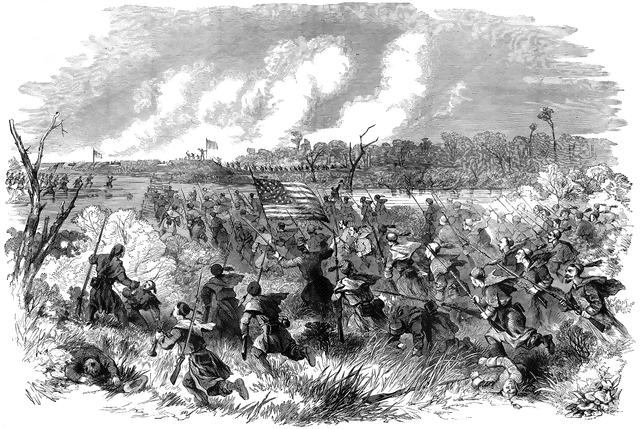

http://etc.usf.edu/clipart/11300/11304/roanoke_batt_11304.htm http://mortgageandcreditdiva.blogspot.com/2010/04/claiming-sale-of-vacant-land-on-your.html
(RalphNader13) Later, they sent down 100 soldiers, craftsmen, and scholars to Roanoke. The Indian Manteo, Sir Richard Grenville, and Ralph Lane came with the men to Roanoke When Manteo had returned to Roanoke he was called the "Lord of Roanoke" by Grenville. Unfortunately, Grenville was more intent of plunder than colonization. And there are claims saying that all he wanted was gold, and riches. All the Englishmen were slightly crazed with the ideas of gold and prosperity. Ralph Lane was the governor of Roanoke, and Sir Richard Grenville was the captain of the military squadron. Ralph Lane angered the Indians and started a war when he had the Indian Chief Wingina killed. The alleged story says that Ralph had Chief Wingina killed over a trade of a cup. (It was a silver cup that had belonged to England that was stolen by the Indians and battle struck out when it was not handed back immediately.) However, there are also stories that Wingina had created a plan with neighboring Indians to attack Lane's troops, and Ralph felt that he would need to have the first attack. Ralph Lane was also said to have angered at the slightest things and often bickered with Sir Richard Grenville.
Grenville had left the men to go back to England, because they were very ill prepared and simply did not have enough supplies to survive. Because it took Grenville longer than expected the colonists ended up relying on the Indians. Lane ironically wrote that "It is the goodliest soil under the cope of Heaven; the most pleasing territory of the world" in a letter to Grenville before they had angered the native Indians and needed to be rescued.
http://www.publicbookshelf.com/public_html/Our_Country_Vol_1/roanokei_dc.html
http://docsouth.unc.edu/nc/lane/bio.html
(FrancisPerkins13) On June 1st, 1586, after trade had failed and tensions were high with the Indians, war broke out. Struggles took place on Roanoke Island, as well as as the inner mainland. While these events were occurring, Grenville, who'd gone back to England, was delayed with the resupply for Roanoke. The colonist were between a rock and a hard place. The news was sent to Sir Francis Drake, who was off the coast of Roanoke with a fleet of 23 ships, and thus was sent to help the settlers. Lane and Drake met on Drakes flagship where Drake made an offer to give Lane a ship with adequate supplies to stay at Roanoke a moth longer, or give the colonist an immediate passage home. Lane took the first offer, however, a storm hit and the ship was lost. To Lane's surprise, Drake remained generous, and he offered Lane another ship. However, with war with Spain imminent, Lane asked for passage back to England.
http://www.nps.gov/history/history/online_books/hh/16/hh16d4.htm
(RalphNader13)By 1586, the soldiers had abandoned the colony and were rescued by Sir Francis Drake. Sir Walter Raleigh was disappointed but not yet discouraged and he quickly convinced people to join to become actual colonists in Roanoke. John White became the new governor of Roanoke. John White and the current colonists were much better at keeping peace with the neighboring Indians. Unfortunately though, they still relied on help from England for supplies. John White was able to continue on the ships in order to hasten the journey. White left behind eighty-nine men, seventeen women and two children. While White was gone on a ship the war with Spain took full force and the greed of John White took over and he spent time attacking and plundering Spanish ships. But, since his ships became attacked as well he was forced to return back to England first, and the English would not allow him to return to the Americas until the 1590 when the war was over. When John White finally returned with two ships he found Roanoke completely empty and barren. It was completely barren except for there was one word on a tree. There was the word "CROATAN" carved in. John White never did look at Croatan, and never did find the truth about the colonists. Coincidentally though, Croatan was the land of Manteo, one of the first Indians.
http://www.nationalcenter.org/ColonyofRoanoke.html
http://www.roanoke-island.com/history.html

(John White looking at the message on the tree-RalphNader13)
http://historicmysteries.com/lost-colony-of-roanoke
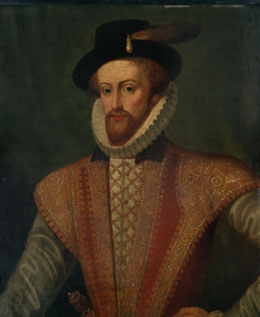
(Sir Walter Raleigh-RalphNader13)
http://www.westernjournalism.com/blogging-tools/historical-documents/exploration-and-the-colonial-era-1492-1765/charter-to-sir-walter-raleigh/
(Jamesfordrhodes13)
It is widely believed that Roanoke Island, located in present-day North Carolina, was the first English colony. The venture of establishing a colony in the New World began with Sir Walter Raleigh, who hired navigators Philip Amadas and Arthur Barlowe to find a suitable location for a settlement. After their expedition, they returned to England endorsing an island about three miles wide, with suitable climate and resources for a colony. Sir Raleigh then recieved a royal grant from Queen Elizabeth I, promptly sending two ships with colonists and led by his two navigators to the new world. The colony lasted for about a year, struggling with poor supplies, shelter and realations with the native indian tribes. The following year, Sir Walter Raliegh made the trip to the colony he helped establish, hoping to deliver much needed supplies to the settlers. But when he arrived, few colonists remained and they returned with Raleigh to England. The expedition was considered a failure until Sir Raleigh gave a second attempt, this time led by a man named John White. Over a hundred men, women, and children set sail for Roanoke Island. John White was dedicated to making the colony a sufficient colony, not merely an expedition for gold or silver. The Roanoke Island settlement did well for a while, the first child in the new world was born, and crops were planted. Soon after, however, John White returned to England for more supplies for the colony. But he was unable to go back to Roanoke Island for 3 years after the Spanish Attacked. When he returned to the New World, the colonists were gone leaving the word "CROATAN" carved into a tree where the settlement used to be.
http://www.u-s-history.com/pages/h602.html
http://www.roanokeisland.net/history/
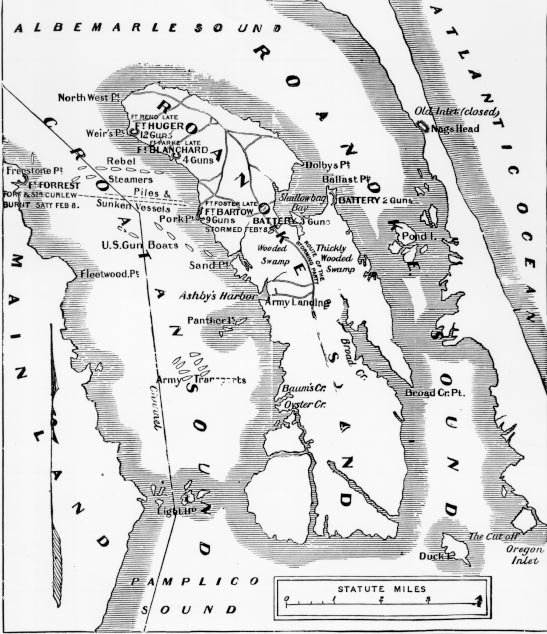
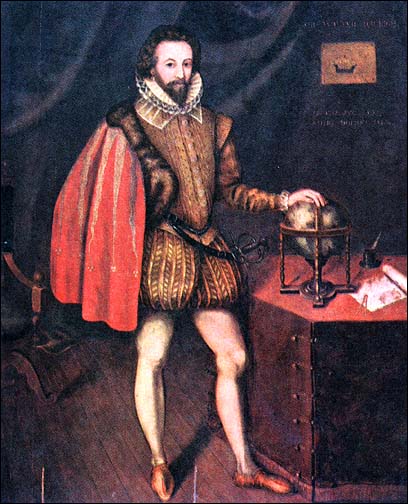
Roanoke Island: Sir Walter Raleigh:
http://www.roanokefreedmenscolony.com/map1.html http://www.luminarium.org/renlit/ralegh.htm
Analysis:
(FrancisPerkins13) In the American Pageant, the authors describes the entire endeavor of Roanoke in a paragraph. The book basically states that "after several false starts, the hapless Roanoke colony mysteriously vanished, swallowed up by the wilderness." Why did the authors not describe the events at Roanoke further? Why not have an entire section on English attempts at colonization? It seems the book also left out important details of one of the possible reasons the colony vanished, the natives. The battles that were fought between the Natives and the settlers were possibly the reason the colony went disappeared. The cause of these skirmishes was because of the English social archetype. The colonists most likely had set laws, which were different than the Indians, and this could cause tension between the respective societies. But, again, the American Pageant doesn't mention any of these theories.
(RalphNader13) One of the main themes throughout Loewen's novel is how the textbook can be biased and leave out information. And I felt that was remarkably true because the textbook hardly covered any information on the island that mysteriously disappeared. It almost seemed that the textbook did not want to focus on the flaws. How can people benefit from the past if they do not know the truth of the past and what has actually happened? I wish the textbook had focused on why the island could of gone wrong, rather than the result. The American Pageant could easily of talked about the fights with the Indians, or the greed of all the colonists. Or how nothing would be accomplished until the colonist focused on survival and then they could search for gold.
(terrencepowderly) In the textbook, the author seems completely negative and bleak toward the subject of Roanoke Island. He uses the words like "pathetic" and "embarrassingly". The author gives off a persona that the colonists did not even try to make the settlement permanent. The American Pageant does not mention the struggles that lead to the downfall of the colony. In Lowen's novel he discusses textbook biases. He discusses that writers can leave out important information or include only certain elements of history. Another way that textbooks uses bias is in their wording. I noticed that in American Pageant. Our textbook also leaves out many important details concerning why the colony was a failure. The author did not mention the reasons why help could not come for colonists. The author did not even mention that the colonists were sending for help. I think that detail sheds light on the whole subject matter.
(michaelcollins13) In the sections that Roanoke Island were described in Lies My Teacher Told Me it was as if Lowen wanted to quickly get through the topic and keep going on with his lecture about the truths of Native Americans. The same with the American Pageant. The textbook does not get into the interesting details that make the historic story captivating. Could this have been an inspiration for the original Peter Pan? If the books went into more detail about the flaws, the facts, and the questions of the island think about the minds that would spark from the ideas or wonders that popped into their heads. These are the type of things that the history books need to put into their books because what it does, is it sparks their imagination and to do that means creativity and ideas leading to into (in the long run) a better future because of the past.
(Jamesfordrhodes13) To students learning about colinization of the New World, Roanoke Island is actually very intriguing. It's a great mystery, it's a loose end, and that draws people in more than other aspects of history might. Which is why i was so surprised that both Lies My Teacher Told Me and The American Pageant spent such little time on it. Our textbook even described it in a shamed, embarrassed tone. From what i learned, though the colony was "lost", it was not a failure. It led to further colonization and errors to correct from. I get the impression that the history of Roanoke Island would not have even been mentioned had it not been for a comparison to the Spanish's success, which is unfortunate because it is a pretty out of the ordinary occurrance. If students should be interested in history, as Mr. Loewen repeatedly states in his book, then telling these tales is quite important to spike curiosity.
Critical Thinking
(FrancisPerkins13) After reading the textbook, I realized how much Loewen's themes meld into the text. I find it strange how Authors leave out information on one topic, and instead, focus on another. Heroification is definitely prevalent as well. For example, if one read about George Washington in a textbook, one would read of success. However, of course Washington had flaws, he is only human but he is perceived as invincible in textbooks. I feel like I will approach the textbook as a resource to get the main picture of what is occurring in a certain event, but, I cannot only use the textbook. To obtain a clear image of what happened in an event, I will need to use multiple sources, or I'm bound to use either melodramatic information or not obtain the entire picture.
(RalphNader13) From now on I will try to read the textbook with an open mind, but I will make sure find the facts of any writing. And I will always make sure to verify any thing that I hear. Loewen's novel Lies My Teacher Told Me really taught me the importance of how there are more than one side to every event and every person. I hope that I will remember all of the themes, and I won't fall back into the habits of how I used to approach history. Because to have an incorrect sense of history can be very dangerous and could lead to falsely presenting information could lead to history not being remembered correctly. And everyone would just have a biased opinion of what happened and no one would know the truth. I believe that I would still trust the textbook for simplified information, but before I would ever say anything or put my name on a stance I believe it is important to know information from more than one source.
(terrencepowderly) From doing this assignment i have learned not to necessarily believe what source says, even if it is an educational source. all sources need to be check with multiple references. Lies My Teacher Told Me really brought to light the bias and twisting an author can bring to a textbook. I always thought that a history textbook had to tell the truth. They do, but now i see how they can twist there words to bring their own opinion to the facts. A students intelligence can really be scared by things like heroification and melodramatic information. Throughout the rest of the year I will surely be checking the textbook and all information i am given to see if it has any of the themes from Lies My Teacher Told Me.
(michaelcollins13) I have learned from reading both the American Pageant and Lies My Teacher Told Me that the stories that a person hears are not always the shiny truth. To genuinely find the truth behind a story a person has to (to name a Disney movie quote) "dig a little deeper." The way the Lowen explains how the facts of a text book can be watered down or twisted into an opinion is truly eye opening. When reading only one source a student can be blind to Sir Raleigh's true determination and "stick-to-it-tiveness" to keep his found colony alive. When the school year approaches this year I am sure to look at the facts from a completely new perspective than I did before.
(Jamesfordrhodes13) Mr. Loewen's book stresses the importance of being proactive when it comes to learning history. I've learned from Lies My Teacher Told Me, that no matter what source you are reading or what topic you are learning about, chances are there is a bias involved. In order to remember facts and generally be engaged by history it is important to make your own inferences and develop your own opinions. This year when i'm learning about both things i've briefly heard about and things that are completely new, i'll question everything and try to look at things with an unbiased eye.
Comments (18)
JamesMonroe08 said
at 11:41 am on Aug 17, 2012
(to FrancisPerkins13): The content on this page is very well-organized and easy-to-understand. I agree that textbooks do sometimes omit important details, making the reader feel as if he or she does not have enough information. On frequent occasions, I also need to look at outside resources to understand the entire situation.
FrancisPerkins13 said
at 12:58 pm on Aug 19, 2012
(To RalphNader) Thanks for adding to the story, it really fleshs out the rest. I'm not sure if I need write more to the anaylsis or Critical Thinking.
RalphNader13 said
at 1:59 pm on Aug 19, 2012
(Francis) no problem just helping our project.I think some parts that I added seem kind of repetitive though... and I think maybe we both need to add to the critical thinking? But I had thought your analysis was well written.
LouisPasteur07 said
at 1:22 pm on Aug 21, 2012
The story of the lost colony has always fascinated me and given me a want to learn more about it. I did notice though that it says in the last paragraph of the overview that John White never did look at "Croatan." I am going to guess this is a typing error because he did go about searching for a while but without any luck as stated. Other than that, great page!
JohnGlenn10 said
at 3:42 pm on Aug 21, 2012
The passages contain a lot of good information. The textbook cannot tell every detail that history has. Since this story is not as important to history as later more lasting English settlements, every theory of Roanoke's situation cannot be described in a limited amount of textbook space.
SamuelMorse11 said
at 1:04 pm on Aug 22, 2012
To terrencepowderly- I thought your analysis was interesting in how much the textbook left out. The arthor left out some key information and that is why you can not just rely on your textbook for information, you have to use outside sources. I really liked the whole page, well organized.
DanielShays01 said
at 1:23 pm on Aug 22, 2012
I thuroughly agree with what you all said about checking your sources again before believing everything! Totaly a GREAT idea! This page has a lot of great informatio. Thjis story has been something i personaly have wondered about and this page def cleared up some of my questions! thanks! and great job!
TheodoreRoethke01 said
at 1:58 am on Aug 23, 2012
I have just completed reading the last of your 'critical thinking' portion and I am pleased to hear that you all have come to realize that textbooks are not always a cut and dry matter. But, I really wanted to let you know that textbooks do so for a reason, and that we, as a nation, will always need that. George Washington is put in a lens of invincibility because America will need that hero. If historians all of a sudden decided to point out all of his flaws and undermine his popular qualities, a large part of what we base our patriotism would decay quickly. Knowing the truth about history is important, but always try and reason out what you think the truth is, because that is one of the greatest misconceptions. Always remember the fallacy of the absolute truth.
WilliamPhips02 said
at 9:38 am on Aug 23, 2012
I really liked this groups page! I think that you guys did a great job of helping the readers understand more about Roanoke island and what happend to its colony. I also enjoyed reading your groups critical thinking section, and hearing what you had to say about Loewen's themes. Great job!
FrancisPerkins13 said
at 4:50 pm on Aug 26, 2012
Thanks guys, Terrence, you basically copied all of my stuff by the way. Write other items.
FrancisPerkins13 said
at 4:58 pm on Aug 26, 2012
continued: just the first paragraph
FranklinPierce03 said
at 7:14 pm on Aug 26, 2012
I enjoyed learning more about the founding of the colony instead of just hearing about the mystery of its disappearance for the thousandth time....
Here, though, I found some new and intriguing information.
NormanMailer02 said
at 9:39 pm on Aug 26, 2012
I really liked this page alot! I think everyone did a good job. I liked how they put in about the settlers carving "Croatan" into a tree and how they talked about the settlement being small which is true. I think the reason why they put "Croatan" into the tree was to tell John White that they were going to become Croatans. Thanks guys.
ThomasNast14 said
at 9:46 pm on Aug 26, 2012
I liked reading the information on this page, the Roanoke colony is an interesting subject in my opinion and the articles on this page are well written. I also agree with FrancisPerkins13 in that the textbook could have included much more information than a single paragraph on early English colonization efforts, particularly the story of Roanoke, and put emphasis on the importance of those endeavors and the lessons they taught.
ArthurMiller05 said
at 11:01 pm on Aug 29, 2012
I really enjoyed reading your page because unlike the textbook, your page focuses on the events that took place at Roanoke Island. I also agree with FrancisPerkins13 that the textbook should have gone into greater detail about Roanoke Island, and not so much England. I have always found Roanoke Island an interesting topic in history, however, I agree with michaelcollins13 that it does seem like a lightly covered topic. I believe that more people would enjoy studying Roanoke Island if teacher gave more time to cover it.
JanetReno12 said
at 1:40 pm on Sep 1, 2012
I agree with ArthurMiller05, you guys got really in depth into the events that occured in roanoke island. You didnt follow the book which mainly talked about roanoke island in reference to england, instead of as its own separate topic. The information was easy to read and most of the contributors wrote about different aspects instead of jus t reiterating the same facts wit different words which means they obviousy did deep research.
GeorgeMarshall07 said
at 9:43 pm on Sep 2, 2012
After reading this page I learned more about “the lost colony” then I did with the textbook. I wish we knew what happened to it and its’ people. I always thought the colonist were killed by the Indians, moved to a different location but died without the right supplies, or blended with the Indians. I never really thought of a hurricane killing them and it seems very likely. I have always wondered what happened to them and why didn’t John White find anything that belonged to the colonist and what the heck was the word “Croatan” doing on a tree and what did it mean.
FranciscoPizarro05 said
at 9:57 pm on Sep 2, 2012
I overall liked this page even though a lot of the information was restated multiple times. Terrencepowderly I particularly enjoyed how you explained all of the probable things that could happen to the colony. I read a book which discussed Croatan and what it could mean, but I never knew that it was an Indian tribe. The evidence you stated that supported the facts that they may have adopted the Indians culture was also impressive.
You don't have permission to comment on this page.